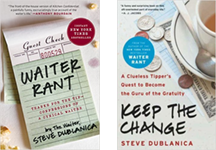My father needed to have his hearing aids adjusted so, once again, I found myself going to Costco. Because there was a bad accident on the highway, we were half an hour late.
“There won’t be any handicapped spots,” I said, frustrated.
“You said that the last time,” my dad said.
As luck would have it, an SUV was pulled out of a handicapped spot on my right, so I clicked on my blinker. Hidden by the SUV’s mass, however, another car was signaling to make a left into the same spot. Oh well.
As I wrenched my car into the coveted spot, the face of the old woman behind the wheel of the other car twisted into a rictus of white hot rage and, although I’m not a lip reader, I’m pretty sure she called me an asshole. Shrugging, I got out of my car, hauled my dad’s wheelchair out of the trunk and wheeled him to the hearing aid department. Because we were so tardy, I thought we might lose the appointment, so I pushed my dad past the line of old people waiting for the audiologist to plead my case.
“Excuse me,” an old woman said, “I don’t appreciate you cutting in front of me.”
“I’m not cutting in front of you,” I said, “I just want to ask the receptionist something.”
“No,” she said. “When you cut me off in the parking lot. That wasn’t nice.” Just great. The lady who called me an asshole. Then I realized, despite whatever handicap this lady had, she’d got inside the store much quicker than I did. That I was escorting a person obviously frailer than she didn’t to seem to bother her a whit.
I was taught to respect my elders and, most of the time, I do. But a therapist once told me, “People are cut from whole cloth. How they handle things when they’re young will probably be how they deal with things when they’re old.” Translation? If they were jerks when they were young, they’ll probably be jerks when they’re old. Feeling my gorge rising, I wanted to say, “My cripple trumps your handicap, lady so tough shit,” but kept my mouth shut.
Feeling the aggrieved oldsters’ eyes burning a hole in the back of my skull, I leaned over the counter, explained to the receptionist why we were late, and threw myself on her mercy. Luckily, seeing my dad in his chair, she took pity on us and said she’d fit us in. “You’ll have to wait at least forty minutes,” she said. “There are other people ahead of you.”
“No problem,” I said.
“Go to the food court,” she said, winking. “Get your dad some food they won’t let him have in the nursing home.”
“Good idea.” I said, spinning my father around to go get a slice of pizza.
“What happened back there?” my dad asked after were safely away. I told him.
“You always get worked up over handicapped spots.”
As my father and I munched on some pizza in the food court, I thought about my last experience at Costco – when I saw angel fire in a baby girl’s smile and creation’s spark in a kiss. But now, as I surveyed the mass of shoppers queued up at the registers, such beauty seemed elusive and I thought about the ugliness in myself. Should I have let that old lady have the spot? Been a kinder person? Be kind. Isn’t that the mantra I hear mothers telling their kids on the playground all the time? Then again, to quote a great sage, “I want you be nice until it’s time to not be nice.” But how do we know when it’s time not to be nice?
A couple of years ago, I was talking with a military chaplain who had served in Iraq and Afghanistan. A problematic conflict to be sure and I asked him how he squared his role as a man of God while counseling young men in a combat zone. “What would have happened if the Good Samaritan showed up fifteen minutes early?” he replied. “Hold that man’s cloak while robbers beat him almost to death?” I’d never heard it put quite that way.
“You can be all meek and gentle and let invaders take your village without resistance,” the chaplain continued. “But what happens when the conquerors start killing all the military age men in the village, rape the women and sell the children into slavery? What did pacifism get you then? Even worse problems.” Maybe if that Samaritan showed up earlier, he’d have gone Roadhouse and opened a can of Patrick Swayze grade whoop-ass on those brigands. If I was being violently mugged, I pray someone would throw a few fists to save me. If my town was invaded by Russians, I hope some rough and ready men would parachute in to kick their asses. Sure, that isn’t nice, but the alternatives would be worse.
As I have said before, being “nice” is sometimes a lie. A while back, a woman was raped on a Philadelphia train in full view of several passengers who did nothing to help her – other than record the attack on their cellphones that is. “Anybody that was on that train,” a police official said, “Has to look in the mirror and ask why they didn’t intervene or why they didn’t do something.” There’s probably lots of reasons why nobody helped that woman, but I’m sure, if you asked them, they’d all claim they were “nice” people.” Maybe they are, but they sure as hell weren’t decent. If it was my wife our daughter being attacked, I hope someone would lay that rapist out cold. That would be the decent thing to do. It would be the kind thing to do.
Isn’t it funny that, despite all the appeals to “being kind” we seem to be living in the most uncivil of ages? Just look at social media, our politics, or how drivers are acting on the road today. It’s a vicious free for all, leading me to believe that brainwashing our kids to “be kind” is just a virtue signaling salve to help adults ignore their own savagery and selfishness. Of course, talking a handicapped spot from an old lady isn’t virtuous act like saving a mugging victim or repelling an invasion but, in my judgement, it was a necessary one. My father needed the spot more and, judging from that woman’s lickity-split mobility, I made the right call. That I felt guilty about it later doesn’t change the fact that it was a moment not to be nice.
My nine year old daughter, who is on the receiving end of numerous appeals to “be kind” at school, places a premium on being nice. Since she’s so young and innocent, I’m content to let her but, a couple of months ago, she experienced some of the cognitive dissonance that occurs when being nice just doesn’t cut the mustard. Natalie had a playmate, a high spirited boy, who was annoying her, and she pushed back verbally – which embroiled me in a small kerfuffle with that kid’s parents. Could my daughter have handled it better? Have been kinder? Perhaps but, when she found out those parents wouldn’t let her play with their child anymore, she tearfully asked me if she’d done something wrong. “Not a thing,” I said.
Being a girl is tough and the last thing I want my daughter to do is censor her feelings when she’s being wronged just to keep a relationship going. Teaching her to be “kind” when a guy’s being a jerk will just set her up for disaster later. Now, that boy’s not a jerk, just filled with the brio that results from a steady diet of snails and puppy dog tails. Lord knows I was miserable to some girls when I was his age but, as I recall, some of them had no problem smacking me upside the head. Kids tend to work things out amongst themselves but, when that mom castigated me for my daughter’s “behavior” I was stupefied. “They’re just kids,” I said. “And their playing nice right now.” But that, as they say, was that.
It was a blow to me personally because I got along very well with that boy’s father. He was a nice man who helped me with some construction projects around the house and I could tell we were kindred spirits but, if I had made Natalie apologize when no apology was necessary to salvage our friendship, then that would have been unkind to my child. Natalie must learn that sometimes sharp elbows must be thrown to get through life and, hopefully, the example my wife and I set will teach her when it’s time to be nice – and when not to be. It’s a tricky balance and I’m sure we’ll mess it up but, in the end, no number of mindless mantras will replace the example a parent sets. Now I know that boy’s parents are nice people and I’m sure they were just trying to protect him, but I mourn that their outsized reaction deprived their son of Natalie’s vivacious personality – and she of his.
“You never know,” I said to my wife, months later. “This could all blow over and, one day, that kid will be asking to marry our daughter.”
“Could make for some awkwardness at the wedding,” Annie said.
“And we’ll be nice as pie.”
But if that boy – or any guy who marries my daughter – isn’t good to her, I’ll go Roadhouse on his ass. Then again, from what I’ve been seeing, Natalie probably won’t need the help.


As I enter my dotage, I see myself more as a Wade Garrett kind of guy now.
Oooh, I bet that hurt don’t it?
😅
In my opinion, nice does not equal kindness. I respond to everyone who says “Oh, you’re so nice” with my own understanding of who I am.
I am not a nice person; I prefer to strive toward kind.
Nice is a way to keep the peace at whatever cost to those involved, often one person wins and the other person loses without a choice in the matter then chooses to overlook the slight. Think “Minnesota nice”.
Being kind is deciding to allow the other person to win this round with a pure heart. I evaluate my cost compared to their cost and decide to let it go.
You did all that with your dad, you and he needed the space more than the lady trying to cut across traffic to score a prime parking space. You were in the right on all counts and were kind to yourself and your dad.
“Anybody that was on that train,” a police official said, “Has to look in the mirror and ask why they didn’t intervene or why they didn’t do something.”
That’s very easy to explain: look at what happened to the guy on a NY subway who DID intervene.
Philly has the same kind of scumbag DA as does NY. It is anyone and everyone who didn’t get out and vote against that DA who “Has to look in the mirror and ask why they didn’t” do the right thing, and vote for a prosecutor who is anti-criminal, not pro-criminal